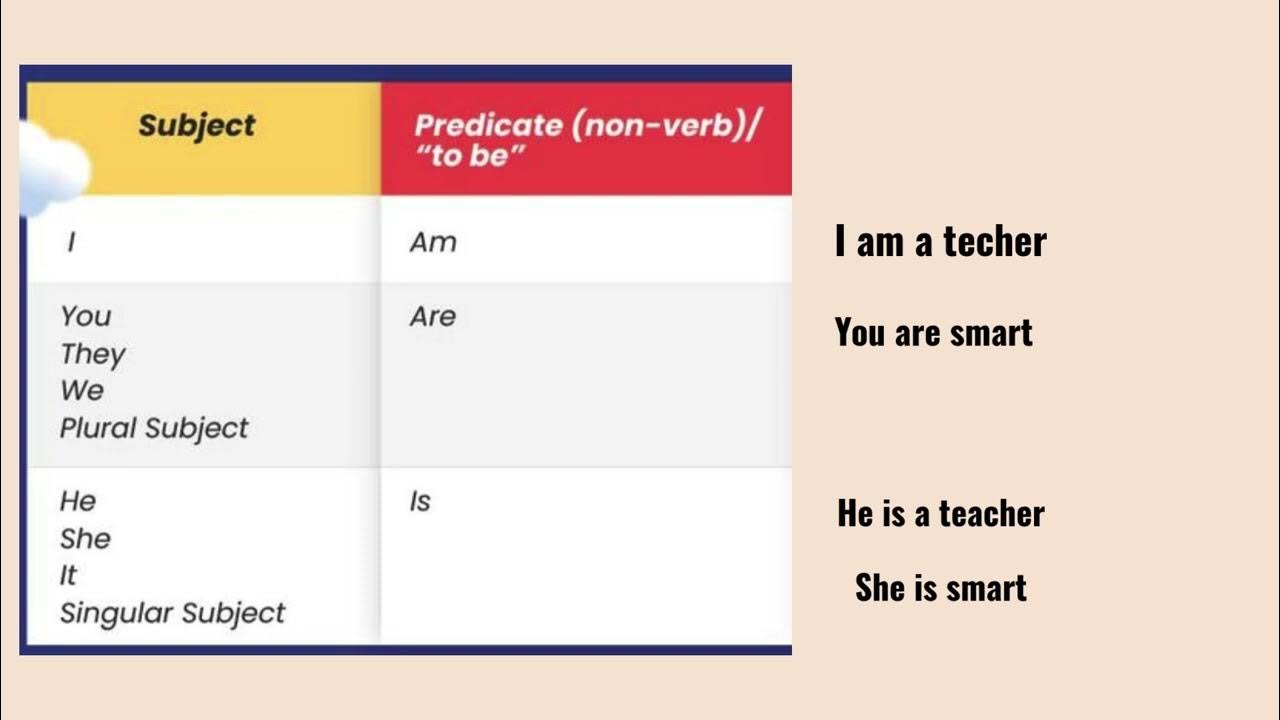Verbo To be (Presente Simples)
Summary
TLDRIn this lesson, the instructor explains the use of the verb 'to be' in the present simple tense in English. The verb 'to be' is shown to correspond to both 'ser' and 'estar' in Portuguese, and the video covers how it functions in affirmative, negative, and interrogative sentences. Key points include the importance of contractions in informal English, as well as how to ask questions by inverting the subject and verb. The video is designed to make learners comfortable with the basic use of 'to be,' providing clear examples and emphasizing its central role in English grammar.
Takeaways
- 😀 The verb 'to be' in English means both 'ser' and 'estar' in Portuguese, but it's a single verb in English.
- 😀 In the present simple tense, 'to be' is conjugated as 'am', 'is', and 'are' based on the subject.
- 😀 The verb 'to be' is used for both 'ser' and 'estar' depending on the context, making it essential for understanding English.
- 😀 Contractions like 'I'm' for 'I am' and 'you're' for 'you are' are commonly used in informal speech.
- 😀 To form the negative, 'not' is added to the verb, with common contractions like 'I'm not' and 'you're not'.
- 😀 The negative form of 'to be' uses 'not' after the verb, and contractions can make it shorter (e.g., 'I’m not' becomes 'I’m not').
- 😀 When forming questions, the verb 'to be' is placed before the subject (e.g., 'Are you...?').
- 😀 English uses only one verb ('to be') for both 'ser' and 'estar', which can cause confusion for Portuguese speakers.
- 😀 The affirmative, negative, and interrogative forms of 'to be' are fundamental for English grammar and communication.
- 😀 Mastering the verb 'to be' in the present simple tense is crucial as it’s the most used verb in English, enabling mastery of other verbs in the language.
Q & A
What is the verb 'to be' used for in English?
-The verb 'to be' is used to express two meanings: 'ser' and 'estar' in Portuguese. It refers to both states of being and existence in English.
How does the verb 'to be' differ in English compared to Portuguese?
-In Portuguese, we use two different verbs: 'ser' and 'estar.' In English, there is only one verb, 'to be,' which serves both functions.
What are the conjugations of 'to be' in the present simple tense for the pronouns in English?
-The conjugations are: 'I am,' 'You are,' 'He/She/It is,' 'We are,' 'You are,' and 'They are.'
What is the significance of contractions when using the verb 'to be'?
-Contractions are commonly used in informal speech to simplify the sentence. For example, 'I am' becomes 'I'm,' 'You are' becomes 'You're,' and 'He is' becomes 'He's.'
How do you form the negative of the verb 'to be' in English?
-To form the negative, add 'not' after the verb. For example, 'I am not,' 'You are not,' 'He is not.' Informally, contractions like 'aren't' and 'isn't' are often used.
What are the contracted forms of the negative for 'to be'?
-The contracted forms of the negative are: 'I'm not,' 'You're not' (aren't), 'He's not' (isn't), 'We're not' (aren't), 'They're not' (aren't).
How do you form an interrogative sentence using the verb 'to be'?
-To form a question, invert the order of the subject and the verb. For example, 'I am' becomes 'Am I?,' 'You are' becomes 'Are you?,' and 'He/She is' becomes 'Is he/she?'
What happens when you want to ask a question with 'you' as the subject?
-For questions with 'you,' invert the word order. For example, 'You are Brazilian' becomes 'Are you Brazilian?'
Can you give an example of a negative sentence using 'to be'?
-Sure! 'I am not tired' or 'She is not at home' are examples of negative sentences using 'to be.'
Why is the verb 'to be' considered the most difficult verb in English?
-The verb 'to be' is considered the most difficult verb because it has various forms, can be used in different tenses, and its conjugation differs in negative and interrogative forms. Once mastered, it simplifies learning other verbs in English.
Outlines

このセクションは有料ユーザー限定です。 アクセスするには、アップグレードをお願いします。
今すぐアップグレードMindmap

このセクションは有料ユーザー限定です。 アクセスするには、アップグレードをお願いします。
今すぐアップグレードKeywords

このセクションは有料ユーザー限定です。 アクセスするには、アップグレードをお願いします。
今すぐアップグレードHighlights

このセクションは有料ユーザー限定です。 アクセスするには、アップグレードをお願いします。
今すぐアップグレードTranscripts

このセクションは有料ユーザー限定です。 アクセスするには、アップグレードをお願いします。
今すぐアップグレード5.0 / 5 (0 votes)






